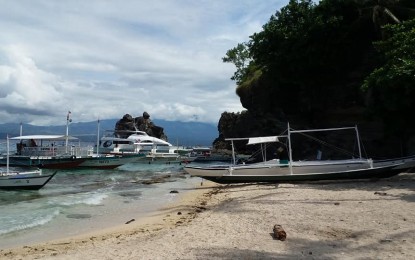
The world-renowned dive destination Apo Island in Dauin, Negros Oriental. (Photo by Judy Flores Partlow)
DUMAGUETE CITY – The Negros Oriental Chamber of Commerce and Industry (NOCCI) is considering various alternatives for helping the tourism industry recover as the province prepares to downgrade its status from enhanced community quarantine (ECQ) to general community quarantine (GCQ) in a few days.
Dumaguete-based businessman Edward Du, Central Visayas regional governor of the Philippine Chamber of Commerce and Industry (PCCI), on Monday said that to cushion the impact of the ECQ, they have told the diving industry players to start brainstorming on options, because for the last 30 years they have been totally reliant on dive tourism.
"We are willing to sit down and help them find alternatives," said Du, who is also former president of NOCCI. He admitted that the tourism industry in Negros Oriental will have a hard time bouncing back from the effects of the ECQ.
Governor Roel Degamo placed the province under ECQ from April 3-18 but extended it to April 30 to ensure that the number of suspected and confirmed coronavirus disease 2019 (Covid-19) cases would drop or no longer be a threat.
Although the governor is still expected to make an announcement on or before April 30, it is expected that Negros Oriental would be downgraded to GCQ as it is not in the list of provinces/areas in the Philippines that were recommended for ECQ extension up to May 15.
“For us businessmen, it does not matter whether it’s ECQ, GCQ, or community quarantine, it’s all the same as the country’s economy is reeling from the effects and impact of the current state brought about by the Covid-19,” Du said.
He said in Negros Oriental, for instance, tourism is the number one source of income and livelihood even though the province is primarily agricultural in nature, unlike Cebu, which is a manufacturing hub.
“Most of the jobs here are really in the service industry,” and that's related to tourism, Du said.
Hotels, resorts, dive shops, and the people in these businesses have lost a lot of income, and many people have lost their jobs and once the ECQ is downgraded to GCQ, or even lifted if the province is cleared of the coronavirus threat, “we don’t know yet what is going to happen, because there will be restrictions, such as social distancing”.
This would mean, for example, restaurants and bars having to make adjustments in their seating arrangements, and people would still be wary to dine out, he said.
Diving is a leading attraction in Negros Oriental, but with the commercial air travel ban, the diving industry here has seen a steep decline, Du said.
Du said 50 to 60 percent of the province’s tourism revenues are from diving, because “that’s where most of the foreigners go, to Apo Island in Dauin”.
And by tourism, Du said he also means any business that is also related to this industry, such as restaurants, bars, spas, the transport sector, souvenir shops, dive tour operators, and the like.
“Everything is connected to tourism, and once all this is over, I don’t think we can go back to our previous normal lives,” he said.
“It’s going to be a new normal for us, but what lies ahead, nobody can really tell,” he added.
Du said it is high time for people to start thinking of other options, and right now “our only saving grace is the BPOs (business process outsourcing), which is giving us income, and the Overseas Filipino Workers, too”, as they are bringing in money from overseas.
At least, there is still some form of income for the province, and of course, that from government, otherwise “patay gyud ang Negros Oriental (the economy of Negros Oriental is dead),” he said.
“Our economy here will really not go back to normal, that is really impossible,” he added.
“To resume to normal, you have to bring back tourism, the movement of people through public transport, but unfortunately, there is social distancing, which will impact on the businesses that rely on “volumes,” Du said. (PNA)
